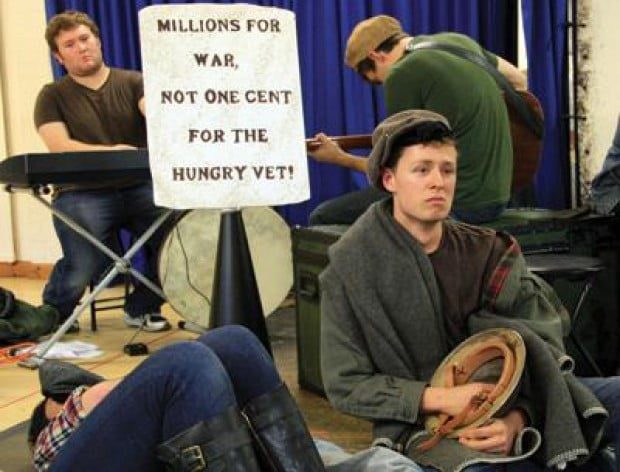
“Fringe First” award caps fruitful summer in Edingburgh and Glasgow.
By Melonie Magruder / Special to The Malibu Times
Pepperdine’s theatre department has won a prestigious award from the 2012 Edinburgh Festival Fringe-one of the world’s most renowned theatre festivals-with a newly commissioned play that celebrates American folk music, civil disobedience and First Amendment rights.
The world premiere of “Why Do You Stand There in the Rain?” by award-winning Scottish playwright Peter Arnott snatched up a “Fringe First” award, rave reviews from global critics and a nomination for Amnesty International’s Freedom of Expression Award.
How such a unique spin on Americana came from a Scottish playwright in a Scottish play festival is a compelling story in itself.
The Pepperdine theatre department has been performing at the Festival Fringe since 1985, most recently under the direction of Cathy Thomas-Grant. Two years ago, with the help of alumnus, actor and newly minted Celtophile Alex Fthenakis (’08), Thomas-Grant commissioned Arnott to write something specifically for the Pepperdine theatre students who spend several weeks each summer in the UK.
“I came to Scotland with Cathy in 2008 as a graduating student,” Fthenakis said in a 3:00 a.m. (his time) phone call from Scotland. “After the Edinburgh festival, I cancelled my return flight to stay here.”
Part of Fthenakis’s enthusiasm for the Scots lay in their reverence for theatre as social conscience. Playwrights’ Studio, Scotland is a national literary clearinghouse that promotes and supports Scotland’s rich arts culture, and was Fthenakis’s and Thomas-Grant’s first stop in their quest for a unique theatrical experience for the Pepperdine students.
Arnott mentioned that he had an idea for a play that had been germinating for years – the “Bonus Army” of 1932. That year, some 43,000 World War I veterans and their families marched on Washington, D.C., demanding payment of a promised military bonus for their services more than 10 years before. It was the beginning of the Great Depression and many vets were out of work. By June of that year, they were massed on the lawns around the U.S. Capitol while the Senate voted to deny their cash bonus.
Riots ensued, camps were torched and the then-deeply unpopular President Hoover ordered the army to evict the Bonus Army. The conflict was not resolved till several years later, when President Roosevelt issued an executive order giving 25,000 veterans desperately needed jobs in the Civilian Conservation Corps.
The title of the play came from a song about the events penned by folk music hero of the “everyday American,” Woody Guthrie.
“With the Occupy movement happening, Peter thought it would be a timely piece,” Fthenakis said. “He needed a lot of young American men for the play so this seemed the perfect opportunity.”
Arnott brought his rough draft of the play to Pepperdine last spring to workshop and, by the time students arrived in Glasgow in June to rehearse, the play became a documentary with songs of the era (including those by Guthrie and Huddie “Leadbelly” Ledbetter) and compositions by Scottish composer John Kielty.
Not content with one social action statement, the Pepperdine team also mounted “Anon(ymous),” the UK premiere of a play by Naomi Iizuka about the plight of refugees suffering abuse and exploitation when seeking asylum. Both productions received rave reviews and nearly sold out audiences in a festival that offers some 1,500 productions.
“The kids didn’t originally feel connected to the work,” Thomas-Grant said. “So Peter came in and asked why they wanted to do this play. The pepper spray incident at UC Davis (where students with the Occupy movement who were peacefully protesting were pepper sprayed by campus police) came up and that created an opening.”
Thomas-Grant said the play’s metaphors for what is happening today, with returning Iraq and Afghanistan vets suffering from PTSD and high suicide rates, is clear. The fact that the play’s characters had to petition their government for redress in a public way also resonates in a timely way.
The result was an awakening of sorts for the theatre students, both theatrically and socially.
George Kovalenko will be a junior this year and played one of the roles in “… Rain.” He said the audience reaction to events that happened in not-too-distant history was overwhelming.
He was so inspired by the idea of social action that he dramatized the statement of Yekaterina Samutsevich, one of the members of the Russian punk band Pussy Riot recently sentenced to prison for “hooliganism,” into a one-woman play about social protest and the repressive hand of government.
“It’s extraordinary to know that what you’re doing is having an effect on a societal level,” Kovalenko said. “That is the best kind of theatre. It’s necessary to our culture.”
Fellow student Anna Tullis agreed, saying, “Theatre is a powerful form of communication because of its ability to use storytelling to make poignant statements about reality.”
“When I see a social action play, I typically come out of the theatre wanting to do my part to help,” performer Jesse Perez said. “As long as one comes out of the theatre with something to think about, then I think we’ve done our job.”
Thomas-Grant plans to mount “Why Do You Stand There in the Rain?” as the theatre department’s spring production. After her success in Edinburgh this summer, she knows the bar has been set high for future productions.
“We met a lot of other Scottish playwrights,” Thomas-Grant said. “They use theatre to address social ills. I know we’ll find other great productions.”
